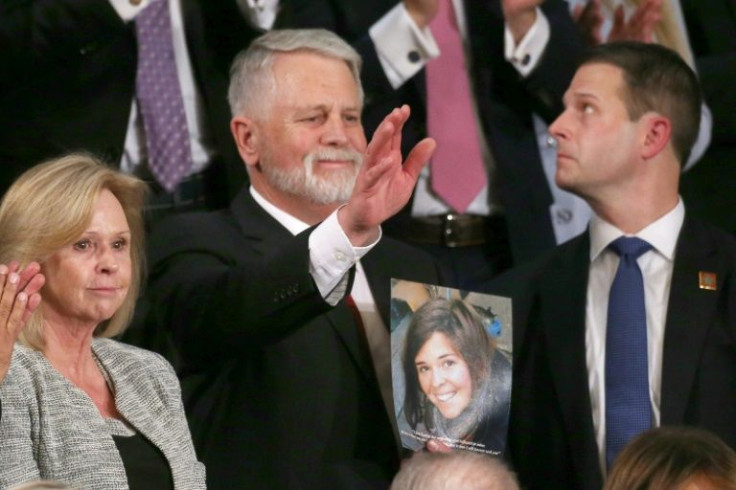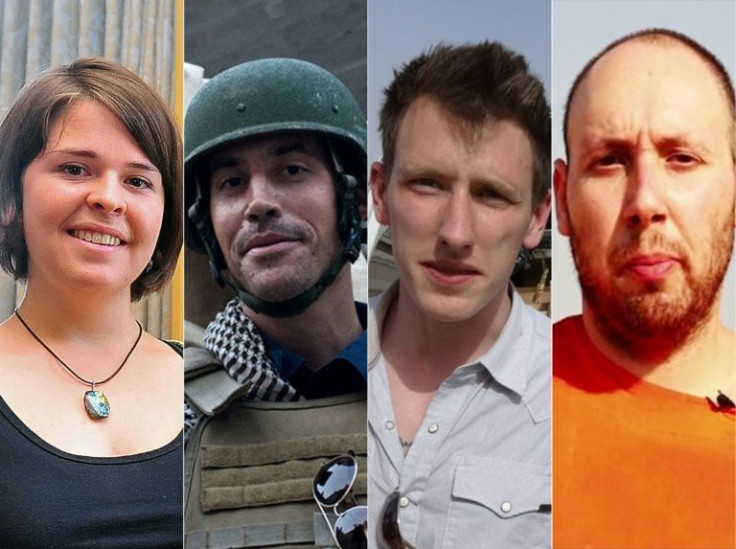Kayla Mueller's Mother Recalls Pleas To IS To Spare Her Daughter
The mother of slain US relief worker Kayla Mueller testified Tuesday at the trial of one of her daughter's alleged Islamic State captors, recounting the desperate pleas for her release and tortuous negotiations.
Marsha Mueller's emotional testimony came on the fifth day of the trial in US federal court of El Shafee Elsheikh, a 33-year-old former British national.
Elsheikh is accused of involvement in the murders of Kayla Mueller and three other Americans: journalists James Foley and Steven Sotloff and aid worker Peter Kassig.
Marsha Mueller's testimony came a day after Kayla Mueller's boyfriend, Rodwan Safarjalani, took the witness stand against Elsheikh, an alleged member of the notorious IS kidnap-and-murder cell known to their captives as the "Beatles" because of their British accents.
Occasionally dabbing tears from her eyes, Marsha Mueller recalled how her daughter had worked at an orphanage in India and taught English to Tibetan refugees in Dharamsala before going to Syria.
"She was always interested in helping people," Mueller said.
Kayla Mueller was captured by IS in August 2013 while accompanying Safarjalani, a Syrian national, on a trip to a hospital in Aleppo where he was contracted to repair a satellite dish.

Marsha Mueller told the court about email exchanges with her daughter's captors, who were demanding a ransom of five million Euros or the release of Aafia Siddiqui, a Pakistani woman who is imprisoned in the United States for the attempted murder of US soldiers.
"We don't want to harm her," the hostage-takers said in a May 2014 email. "She is like a guest with us at the moment."
But, they warned, if the Muellers could not meet their demands, their daughter would serve "a life sentence just like Siddiqui."
The Muellers told the kidnappers they were asking for "an astronomical amount of money from a family with limited resources."
In one email, they said Kayla's father, Carl Mueller, had retired from the auto repair business he operated in Prescott, Arizona,
They received a curt reply. "Retiring will not help you get your daughter back so go back to work and earn some money," it said.

Mueller said the family had been told by the US government that her captors "will not harm a woman," but they decided to make a personal appeal to then-IS leader Abu Bakr al-Baghdadi.
"Kayla is not your enemy," Marsha Mueller said in the video message. "Show your mercy and release our daughter."
It did not come up at the trial on Tuesday, but it has been reported previously that Kayla Mueller was handed over to Baghdadi, who allegedly raped her repeatedly before killing her.
In September 2014, Kayla's captors added another demand: a halt to US military activities against the Islamic State.
The Muellers received no response to numerous subsequent emails, and IS claimed in February 2015 that Kayla had been killed in an airstrike by Jordanian warplanes.
During a break in the proceedings on Tuesday, Safarjalani, Kayla's boyfriend, approached Elsheikh as he was being led out of court by US Marshals and shouted at him in Arabic that he would end up in hell.
Judge T.S. Ellis warned Safarjalani when the court reconvened that he would be thrown out if there was another outburst.
The judge said he was allowing him to remain in the public gallery because he had only made a "prediction" and not a "threat."
The IS "Beatles" held at least 27 people in Syria between 2012 and 2015, including a number of European journalists who were released after ransoms were paid.
Videos of the brutal executions of Foley, Sotloff and Kassig were released by the group for propaganda purposes.
Elsheikh and another "Beatle," Alexanda Amon Kotey, were captured in January 2018 by a Kurdish militia in Syria, turned over to US forces in Iraq and flown to Virginia in October 2020.
Kotey pleaded guilty in September 2021 and is facing life in prison.
"Beatles" executioner Mohamed Emwazi was killed by a US drone in Syria in November 2015, while the fourth member of the cell, Aine Davis, is imprisoned in Turkey after being convicted of terrorism.
Elsheikh has denied the charges, and his lawyers claim his arrest is a case of mistaken identity. He faces life in prison if convicted.
© Copyright AFP 2024. All rights reserved.




















